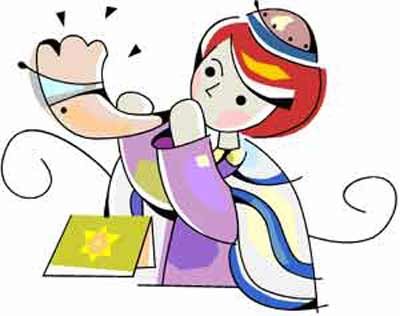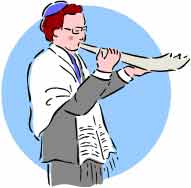Rosh Hashanah
Rosh Hashanah, the Jewish New Year, is the first and second days of the first Jewish month of Tishrei. In 2009 Rosh Hashanah begins at sundown on Friday September 18 and ends at nightfall on Sunday September 20. Rosh Hashanah is closely followed by Yom Kippur, the Jewish Day of Atonment. In 2009 Yom Kippur begins at sundown on Sunday September 27 and ends at nightfall on Monday September 28. This ten day period are commonly known as the Days of Awe (Yamim Noraim) or the Days of Repentance. This is a time for serious introspection, a time to consider the sins of the previous year and repent before Yom Kippur. Rosh Hashanah and Yom Kippur are considered the "High Holidays". Rosh Hashanah, the "Head of the Year" is a happy holiday. People exchange New Year's cards and New Year's greetings. Families gather together for meals and open houses after attending temple services. The synagogue is specially decorated for the high holidays. The Torah is covered in white and the rabbi and cantor also wear white.  During the services it is a mitzvah (commandment) to hear the shofar (ram's horn) on Rosh Hashanah, as it's loud sound reminds us that God is present and that it is time to wake-up and pay attention to our lives. After services, family and friends gather for special meals. They will dip apples in honey and wish each other a "sweet, new year." A special round challah with sweet raisins is also shared at the table.  The traditional greeting Jews extend to one another during this season is l'shana tova tikatayvu, "may you be inscribed for a good year." Or, in shortened form, l'shana tova, "a good year." The traditional greeting Jews extend to one another during this season is l'shana tova tikatayvu, "may you be inscribed for a good year." Or, in shortened form, l'shana tova, "a good year."
Yom Kippur, the day of atonment and fasting is is the most solemn day on the Jewish calendar. This year, Yom Kippur begins at sundown on Friday, September 21st and continues until sundown the next day. During this 24 hour period, Jews will fast. Jews who are elderly or sick, are allowed to take their medicine and some food. Before sundown, Jewish families will gather together and enjoy a festive meal. Then they will go to temple for evening services. The next day is also spent at temple attending services. During the services, prayers are given asking God for forgiveness of our sins and for help in being a better person in the coming year. At the end of the day, after the last service, families will again gather for another meal to "break the fast". One of the ongoing themes of the Days of Awe is the concept that God has "books" that he writes our names in, writing down who will live and who will die, who will have a good life and who will have a bad life, for the next year. These books are written in on Rosh Hashanah, but our actions during the Days of Awe can alter God's decree. The actions that change the decree are "teshuvah, tefilah and tzedakah," repentance, prayer, good deeds (usually, charity). These "books" are sealed on Yom Kippur. This concept of writing in books is the source of the common greeting during this time is "May you be inscribed and sealed for a good year." Thanks to Jim Evans for much of the above information.
Share your Rosh Hashanah memories, recipes and traditions. Click on the link to send e-mail to rosh@ClevelandSeniors.com
Top of Page
Recipes for Rosh Hashanah
Back to Cleveland Jews
Back to Holidays
| 
